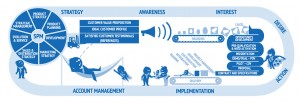The UK is Open for Business

The UK is open for business
The UK ICT market is large (£140bn annual spend), open (over 100,000 businesses), has a thriving tech start-up scene, is the destination of choice in Europe for inward investment and speaks English, the language of choice of the software world. The UK also has relatively low business taxes, and less regulation than many other countries.
So are the streets of London really paved with gold for ISVs and do you just have to turn up to collect your share? If only it were that simple…
Well, almost. I have fifteen years experience of helping non-UK ISVs enter and develop their business in the UK and in my experience I would suggest that a non-UK ISV has two main barriers to entry to overcome. They are both flip sides of what makes the market attractive.
Barrier to Entry #1: The UK is a large, open market.
The hidden barrier to entry that this creates is the high level of competition. When I point this out to a potential client, the most common response is ‘But our solution does things that the our competitors products don’t’. This is good because ‘me too’ products will not succeed in the UK market (unless you have the marketing spend of someone like Microsoft). Unique selling points are a necessary condition for success but it is not sufficient. There are three other things that need to be in place to overcome this barrier to successful market entry.
The first is having a clear value proposition for your potential customer. ‘I’m really not interested in technology’ was one CTO’s comment. What matters is the business value you bring to your customer. It is essential that the value proposition is clearly stated, then tested and refined until it brings compelling value to your customer.

The value chain in the software industry
You will have a value chain that will deliver the value to the customer. You need the elements of your value chain that you don’t control to do things for you and you will also need a value proposition for them, a ‘What’s in it for me?’. This will be different from the customer value proposition and is often either ignored or reduced to ‘you make 10% on any sales’. Sorry, but the market is too competitive for that.
The second thing is how do you get heard above all the competitive noise. As another CTO said: ‘If I had a pound for everyone who called me to talk about their software I would have retired years ago’. Not a very surprising remark when you realize that 3.5% of the UK workforce is employed in call centres. Here is where your value chain comes into play. Apart from the very largest enterprises (and I mean only Fortune 100 sized) your UK prospect will be owned by a vendor’s partner rather than the vendor. Having a value chain that incorporates one or more effective partners is your door opener. I’ll write more about partnering in a later blog.
The third condition for overcoming this barrier is aligning your timing with the market. A while ago I helped an algorithm company enter the UK. Progress was slow in the first year. There was a reason for this. The business issue their technology solved was on everyone’s task list so it was relatively easy to get initial meetings, but the business issue was never in the prospects top three ‘must do’ items. 18 months after initial entry (and with some tweaks to their value proposition) they suddenly became ‘hot’. The only way of finding out about timing is to test the market and see what happens. Be prepared to either accelerate rapidly, or to wait a while.
Barrier to Entry #2: The English language
English is said to be the most widely spoken second language in the world. All of you reading this blog can understand it. Because of this familiarity it can be a barrier to successful market entry. Lots of our humour is based on irony, nuance, tone of voice and other linguistic subtleties. These permeate our business language and culture.

Having an excellent understanding of the English language is essential
I mentioned in my previous blog that communicating well in English is very important. The English language is not defined by a standards body. It evolves by common usage. Your collateral, therefore, needs to be written/translated by a native speaker. Collateral that gives away its origin as non-British (often with dictionary perfect English) will mark you out as not serious about the market.
A foreign accent to your spoken English is not a barrier. What is a barrier is not understanding the nuance of what is said. This can be derived from either the context or the tone in which a statement is made. I had a client last year who got very excited when I put the following entry into their CRM system for one of their targets: ‘will call back’. I had to explain to my client that on this occasion it was English for ‘Go away’. It’s one of at least a dozen ways you’ll hear a prospect say ‘no’ without actually using ‘no’ or even a word that means ‘no’.
Equally, different words can be used interchangeably or not depending on context. Perhaps the UK’s geography provides an extreme example. My wife and I can both say ‘I was born in England, my parents are British, I am a UK citizen and I was brought up in the British Isles’. My wife is using those terms to tell you one thing about her. I am using the subtle differences in meaning to tell you four. Confused? You will only get the correct meaning for us if you know the context of our lives. Now map that level of linguistic subtlety onto your sales negotiation and remember that although you have understood every word perfectly there is a high risk you have missed some important aspect of the meaning.
The dangers of familiarity with English causing problems in the sales process, is, I think, best summed up by one frustrated CSO who said ‘Things happened to me that would never have happened in Scandinavia’. And other than pronouncing ‘idea’ as ‘idee’ his spoken English was flawless and had a native accent.
If I went to China I would need a trusted interpreter not just for the language but also for the cultural protocols. Equally, don’t underestimate the need for a guide in the UK, at least in the early stages.
Do you want to expand to the UK? If you do, a large, open, English speaking market awaits you.
TBK Consult help software companies grow by internationalizing. TBK Consult’s UK based consultants have extensive experience of helping software businesses expand into the UK.








